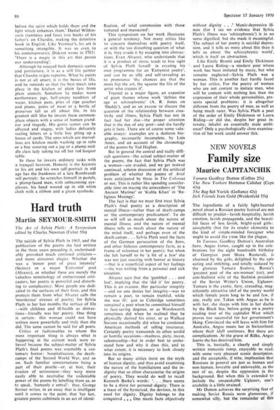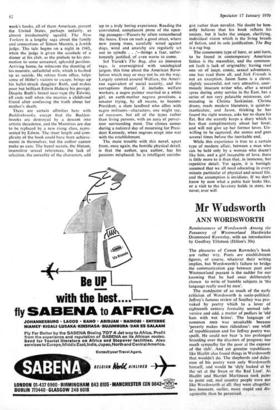NEW NOVELS
Family size
Maurice CAPITANCHIK
Tamara Geoffrey Dutton (Collins 25s)
The New Yorkers Hortense Calisher (Cape 45s) The Bag Sol Yurick (Gollancz 42s) Sick Friends Ivan Gold (Weidenfeld 35s)
The ingredients of a fairly light-hearted novel about a Russian poetry festival are not difficult to predict—lavish hospitality, lavish emotion, lavish propaganda, and the beauti- ful faces of less lavish, bright-eyed girls: acceptable (but for its cruder elements) to the kind of simple-minded foreigner who ought to avoid the USSR like the plague.
In Tamara, Geoffrey Dutton's Australian hero, Angus James, caught up in the cele- brations for the eight hundredth birthday of Georgian poet Shota Rustaveli, is charmed by the girls, delighted by the epic eating and imbibing, and totally seduced by the glorious Tamara Svalova, Russia's 'greatest poet of the sex-woman' (sic), and anti-Stalinist wife of the Stalinist. president of the Soviet Writer's Union, Uglanov. Tamara is the exotic, fiery, crusading, mag- nificently attractive idol of the poetry world which female poets long to be and few, if any, really are. Taken with Angus as he is with her, she sleeps with him in her dacha by the Black Sea, before going on a poetry reading tour of the capitalist West which proves too successful for her government's liking. Convinced she will leave with him for Australia, Angus meets her in Switzerland, where their idyll continues. But there are complications. At the grave of Rilke, Angus learns she has deceived him.
This is, basically, a clearly and simply written romantic romp, enjoyable to read, with some very pleasant scenic description, and the acceptable, if trite, implication that Russians in general are just as human and non-human, loveable and unloveable, as the rest of us, despite the oppression in the background. But when this is extended to include the unspeakable Uglanov, one's credulity is a little strained.
Mr Dutton achieves the surprising feat of making Soviet Russia seem glamorous, if somewhat silly, but the remainder of this
week's books, all of them American, present the United States, perhaps unfairly, as almost irredeemably squalid. The New Yorkers is a lengthy saga about the family and connections of Simon Mannix, a Jewish judge. The tale begins on a night in 1943, when the judge is given the accolade of a dinner at his club, as the prelude to his pro- motion to some unnamed, splendid position. Arriving home, he witnesses the shooting of his neurotic, unfaithful wife, which is hushed up as suicide. He retires from office, helps some of Hitler's victims to escape, brings up his ballet-struck daughter Ruth, and makes poor but brilliant Edwin Halecsy his protégé. Despite Ruth's brutal near-rape (by Edwin), all ends well when she marries a childhood friend after confessing the truth about her mother's death.
There are certain affinities here with Buddenbrooks, except that the Budden- brooks are destroyed by a descent into artistic decadence, and the Mannixes are due to be replaced by a new rising class, repre- sented by Edwin. The sheer length and com- plexity of the book could have been achieve- ments in themselves, but the author cannot make us care. The banal secrets, the blatant, insensitive sexual references, the lack of selection, the unreality of the characters, add up to a truly boring experience. Reading the convoluted, complacent prose of the open- ing passages—Passers-by often remembered the house. Even on such a good street, where new young trees, carefully wired against dogs, wind and anarchy are regularly set out to spindle . . .'—brings a fear, unfor- tunately justified, of even worse to come.
Sol Yurick's The Bag, also an immense saga, is overweighted with sociological jargon, this time about the American Revo- lution which may or may not be on the way. Largely centred around Welfare, the Ameri- can equivalent of social security, and the corruptions thereof, it includes welfare workers, a negro painter married to a white girl, an earth-mother negress prostitute, a senator trying, by all means, to become President, a slum landlord who allies with negro militants—characters, one might say, ad nauseam, but all of the types rather than living persons, with an aura of perver- sion surrounding most. The climax comes during a national day of mourning for Presi- dent Kennedy, when negroes erupt into war with the establishment.
The main trouble with this novel, apart from, once again, the horrific physical detail, is that the author, qua author, has his passions misplaced; he is intelligent sociolo- gist rather than novelist. No doubt he hon- estly believes that his book reflects his society, but it lacks the unique, clarifying, individual vision which is the living breath of fiction, and its sole justification. The Bag is a rag-bag.
The commonest type of hero, or anti-hero, to be found in contemporary American fiction is the masochist, and the common- est fault is lack of originality; having read one set of inept, comic, sexual adventures, one has read them all, and Sick Friends is not an exception. Jason Sams is a clever, slightly successful, not very attractive, enor- mously insecure writer who, after a sexual spree during army service in the East, has a series of not very palatable mistresses, cul- minating in Christa Sarkissian. Christa draws, reads modern literature, is quiet-to- inarticulate, and Jason, thinking he has found the right woman, asks her to share his flat. But she secretly keeps a diary which is less than complimentary about her lover, and will not give up her former loves. Un- willing to be captured, she comes and goes several times before the inevitable end.
While this experience is true to a certain type of modern affair, between a man who can be held only by a woman who doesn't like him, and a girl incapable of love, there is little more to it than that, in immense, but repetitive detail. Yet again, it is boringly assumed that we all need educating in every minute particular of physical and sexual life, and the assumption is invidious. If we don't know by now what a pubic hair looks like, or a visit to the lavatory holds in store, we never, ever will.



































 Previous page
Previous page